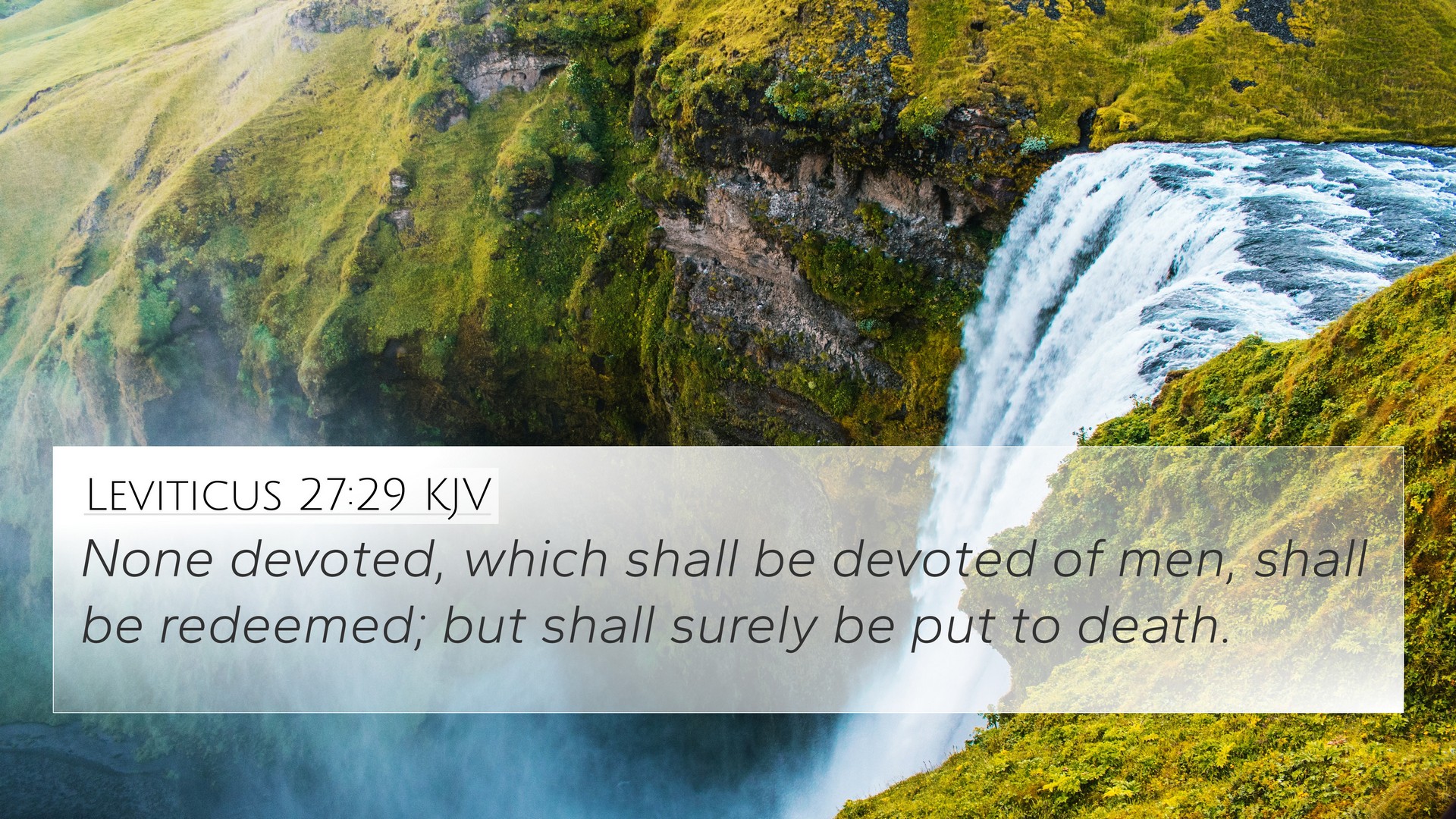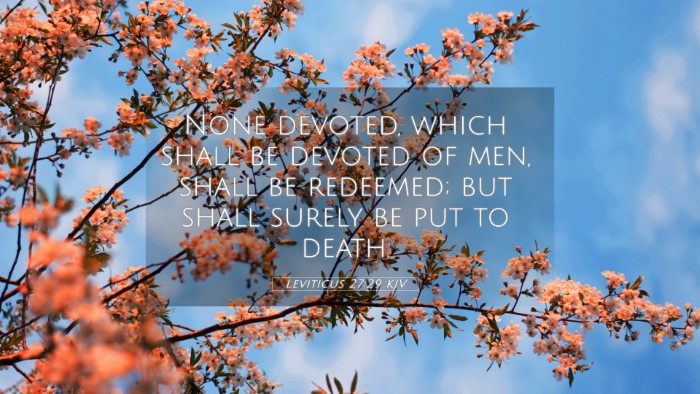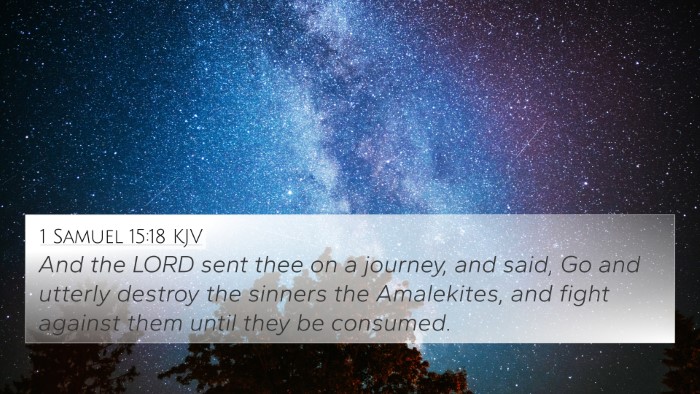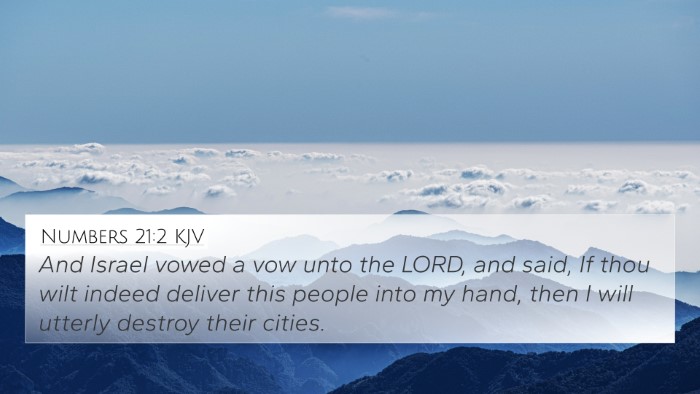Understanding Leviticus 27:29
Leviticus 27:29 states, "None devoted, which shall be devoted of men, shall be redeemed; but shall surely be put to death." This verse is part of the Mosaic Law and carries significant implications regarding vows and dedications made to God.
Summary of Meaning
This verse addresses the seriousness of vows made to God concerning persons who are devoted or dedicated to Him. Such individuals, once set apart for God, could not be redeemed or brought back by any means. The dedication was absolute, illustrating the complete surrender to God's will. This highlights the sacredness of the commitments made before God and serves as a profound reminder of the value and sanctity of human life, as well as God's expectations concerning devotions.
Insights from Public Domain Commentaries
Matthew Henry
Matthew Henry emphasizes the irrevocable nature of the dedication mentioned in this verse. He suggests that those who were devoted to the Lord were entirely at His disposal, much like a sacrificial offering. The verse signifies that certain vows, especially those involving human lives, were so serious that they could not be reversed once made. This elucidates the profound respect for life and service to God inherent in the Israelite community.
Albert Barnes
Albert Barnes elaborates on the idea that dedicated persons were not merely set apart but were considered to have been ‘devoted’ to God through a significant act of commitment. Barnes notes that the Mosaic Law placed heavy emphasis on the spiritual state of dedication, indicating that a person could not return from this status. This aspect can be seen as both a spiritual principle and a practical guidance for those who wish to serve or please God through a dedicated life.
Adam Clarke
Adam Clarke provides a comprehensive analysis of this verse, pointing out the cultural context of vow-making in ancient Israel. He notes that 'devoted' refers to a person set aside for divine service, and emphasizes that the law was designed to protect the seriousness of such commitments. Clarke addresses the implications that this bears on contemporary spirituality, urging believers to carefully consider the vows they make unto God and the weight of their commitments in faith.
Bible Cross References
- Numbers 18:15-16: Discusses redemption of the firstborn; parallels in the seriousness of commitments to God.
- Leviticus 27:2: Explains the process of making a vow to God, emphasizing importance of dedication.
- Deuteronomy 23:21: Contains provisions for vows, with guidelines stressing the importance of not breaking a vow.
- 1 Samuel 15:3: Saul’s failure to follow God’s command illustrates the significance of sacred commitments.
- Isaiah 53:2-3: Talks about being despised and rejected; highlights the gravity of being devoted to God in challenging times.
- Matthew 5:33-37: Jesus' discourse on oaths and vows reinforces the honest nature of commitments.
- Romans 12:1: Calls believers to present their bodies as living sacrifices—echoes the themes of dedication.
Thematic Connections Between Bible Verses
The verse depicts strong themes of devotion and the sacred nature of our commitments to God. Similar themes can be found throughout both the Old and New Testaments—illustrating a continuity in God’s expectations.
- Connections to the sacrifice of Jesus in Hebrews 10:10, where Christ’s offering is once for all.
- In Galatians 5:13, the challenge of dedicating oneself to liberty while serving one another in love parallels the irrevocable dedication of Leviticus 27:29.
- Links with the concept of total commitment can be found in Luke 14:33, where Jesus speaks about renouncing possessions.
Conclusion
In summary, Leviticus 27:29 plays a crucial role in understanding the principles of dedication and the seriousness of vows in the biblical context. The commentaries illuminate the weight of these commitments and prompt believers to engage deeply with their promises made to God. By considering cross-references, readers can grasp a fuller understanding of scriptural themes that speak to devotion and sacrifice across both the Old and New Testaments.
This verse encourages a reflective spirit, inviting believers to explore how their commitments to God shape their faith journeys while recognizing the interconnectedness of biblical texts that instruct, inform, and inspire.




